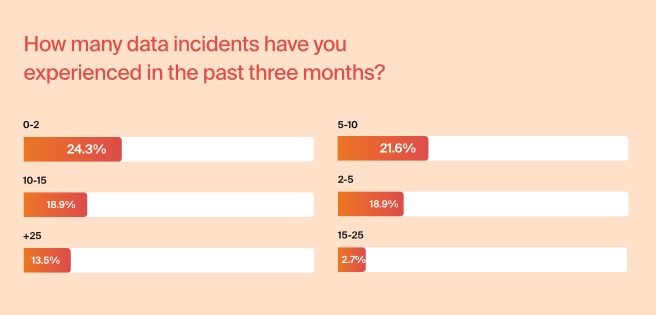Companies experience a median of five to ten data incidents over a period of three months, according to the 2023 State of Data Quality report from Bigeye.
Respondents reported at least two "severe" data incidents in the last six months, which created damage to the business/bottom line and were visible at the C-level. And 70% reported at least two data incidents that diminished the productivity of their teams.
They also said incidents take an average of 48 hours to troubleshoot. And even though data issues most commonly take approximately 1-2 days to identify and fix, the issues can cause problems that last as long as weeks or even months.
Organizations with more than five data incidents per month are going from incident to incident, with little ability to trust data or invest in larger data infrastructure projects. They are performing reactive over proactive data quality work.
The report also found that data engineers are the first line of defense in managing data issues, followed closely by software engineers. The role of data engineer has moved on par with software engineering. Like software engineers, data engineers are in charge of a product — the data product — that increasingly demands software-like levels of process, maintenance, and code review.
Survey respondents say it takes an estimated 37,500 man hours to build in-house data quality monitoring, equating to about one year of work for 20 engineers
Those who used third-party data monitoring solutions found about a 2x to 3x ROI over in-house solutions. They also noted that at full utilization, third-party data monitoring solved for two issues: fractured infrastructure and anomalous data. They further reported that third-party data monitoring solutions had better test libraries, and a broader perspective on data problems.
"Data quality issues are the biggest blockers preventing data teams from being successful," said Kyle Kirwan, Bigeye CEO and co-founder. "We've heard that around 250-500 hours are lost every quarter, just dealing with data pipeline issues."
Methodology: The report consisted of answers from 100 survey respondents. At least 63 came from mid-to-large cloud data warehouse customers (with a spend of more than $500k per annum) who have some form of data monitoring in place, whether third-party or built in-house.



